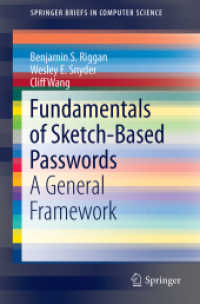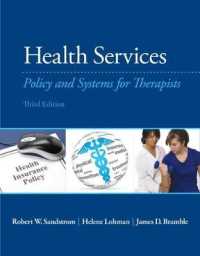Full Description
This book seeks to examine the plight of vulnerable students. Scholars and practitioners will benefit from this in-depth and unique resource for working with diverse populations of students.The term "vulnerable" is the current construct used to address students who are at-risk of dropping out of school or of being mislabeled because of myriad social-economic, structural, educational, cultural, racial, linguistic, and societal burdens that impinge upon their learning and survival in school environments. These populations can include students in urban areas, students with "special" needs, and/or at-risk students who are disenfranchised, disadvantaged, and disillusioned.A few of the topics discussed include students with special needs, the scholar identity of black males, parent perspectives, teacher preparation, and using technology in the classroom.A diverse group of contributors offer their expertise in this distinctive text. Authors include scholars and practitioners from fields such as educational leadership, special education, teacher education, educational technology, and educational psychology.Key Features: explores the diversity of students in today's classrooms: culturally, linguistically, and racially different students; students in urban areas; students with "special" needs; and/or at-risk students who are disenfranchised, disadvantaged, and disillusioned; details multiple strategies for teacher preparation and mentoring; discusses methods for effective parent-teacher collaboration.
Contents
Chapter 1. "Realize That They Don't Know": An Exploratory Study, Floyd D. Beachum, Festus E. Obiakor, & Gina Gullo. Chapter 2. Social Class and Poverty's Impact on Vulnerable Children, Raji Swaminathan. Chapter 3. Nurturing the Scholar Identity of Black Males: Disrupting the Myth of Black Male Inferiority, Ramon B. Goings and Larry J. Walker. Chapter 4. Students with Special Needs: Making them Visible in Today's Classrooms, Tachelle Banks.Chapter 5. Parent Perspectives of Educational Vulnerability in Students with Autism, David E. DeMatthews and Becca Gregory. Chapter 6. The Perpetuation of Vulnerability through the School Racial Discipline Gap, Gina L. Gullo. Chpater 7. Providing Vulnerable Students with Well-Prepared Teachers: An On-Site Mentoring Approach, Phyllis F. Reggio, Roberto C. Trigosso, and Carlos McCray. Chapter 8. "At Risk" Children and Teacher Preparation, Chance W. Lewis, Dante Bryant, Amber C. Bryant, Nakeshia N. Williams, and Derrick Robinson. Chapter 9. Psychological Approaches to Working with Vulnerable Children, Christopher T. H. Liang and Louis A. Rivera. Chapter 10. Using Technology to Work with Vulnerable Children, Sunday O. Obi. Chapter 11. Serving Parents to Save At-Risk Children, Tong T. Xiong and Mateba Harris.








